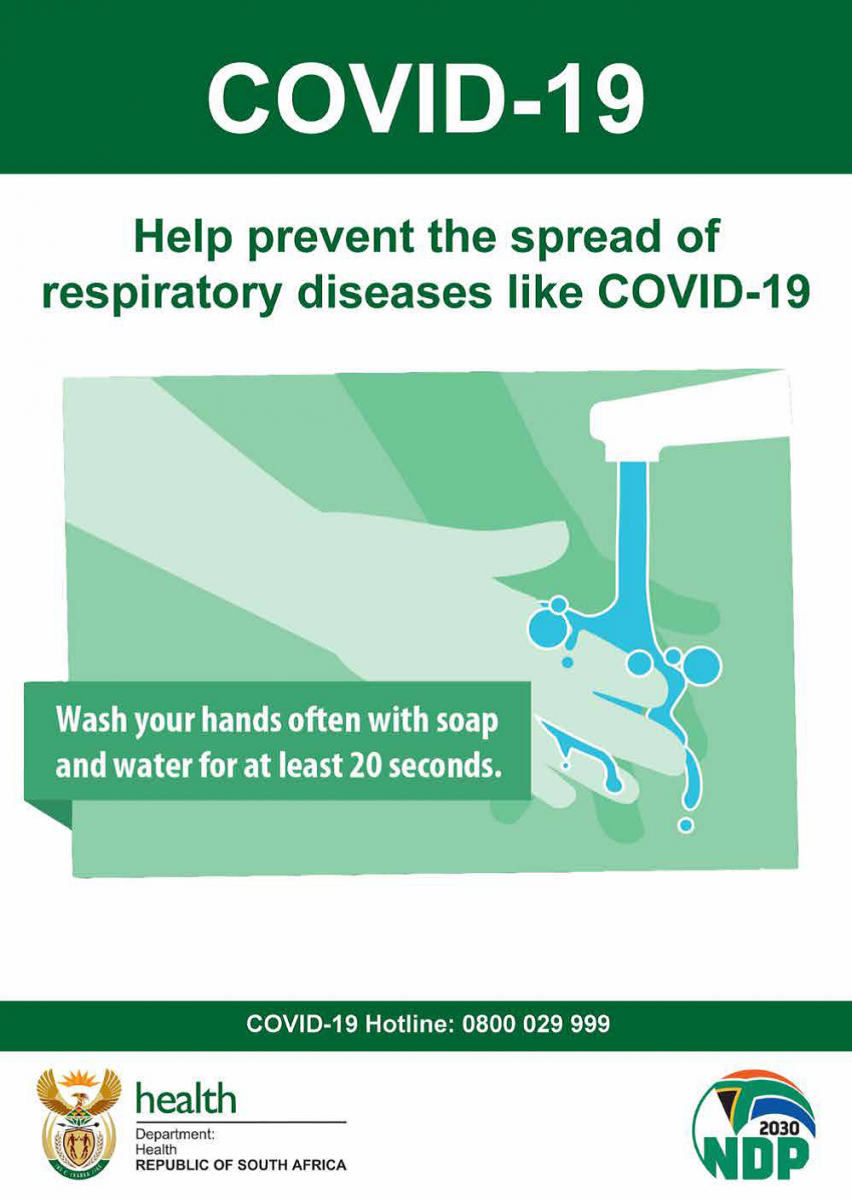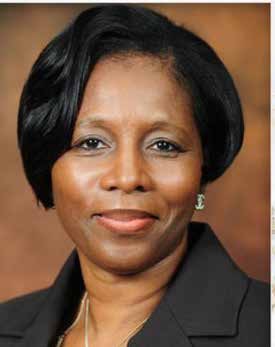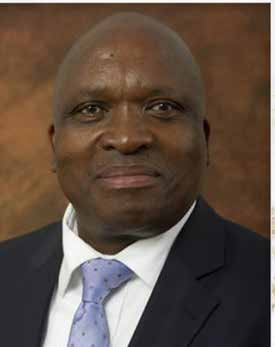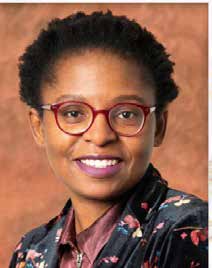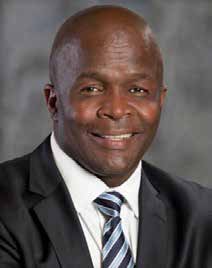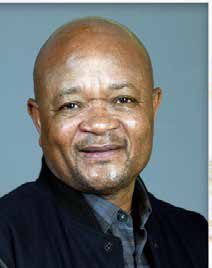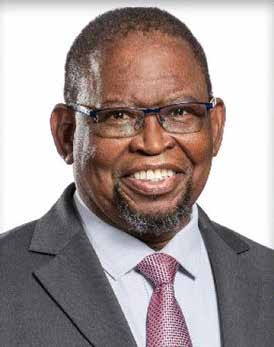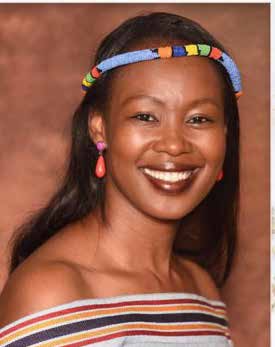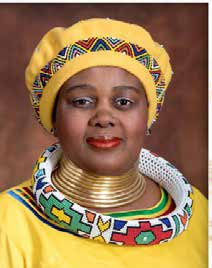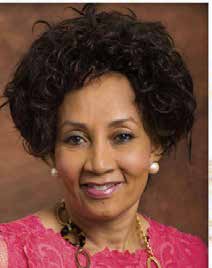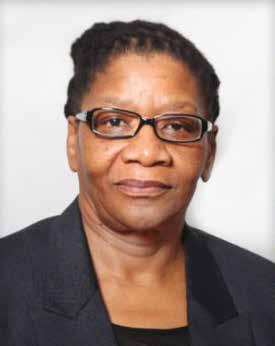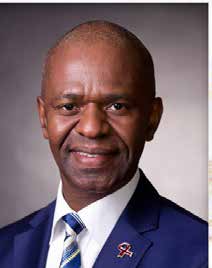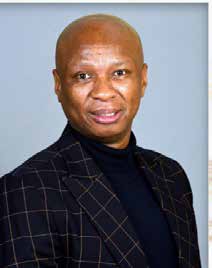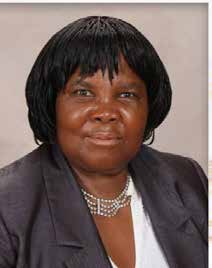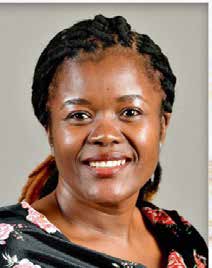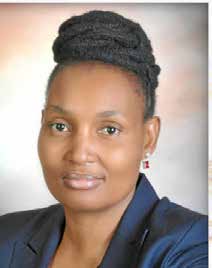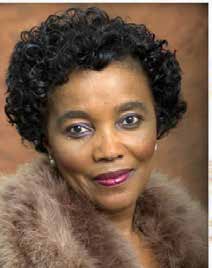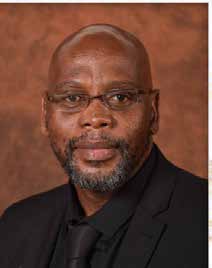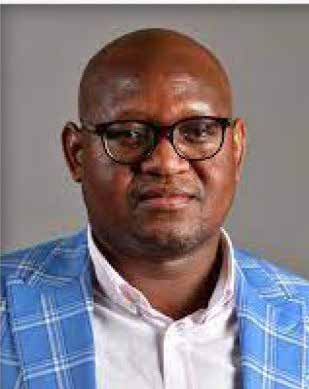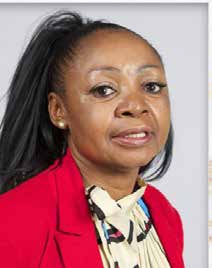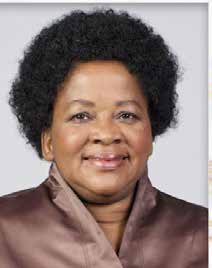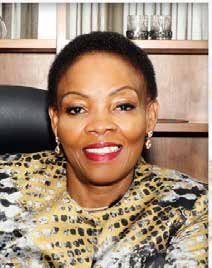Sept 2021 1st edition
Sept 2021 1st edition Estelle Greeff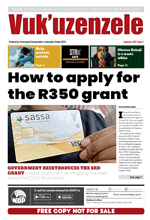
Translations
Afrikaans
isiNdebele
isiXhosa
isiZulu
Sepedi
Sesotho
Setswana
Siswati
Tshivenda
Xitsonga
Black Hawk takes SANParks to new heights
Black Hawk takes SANParks to new heights SiboneloNdabenhle David Simelane (40) has become the first black chief pilot for South African National Parks (SANParks) Air Services.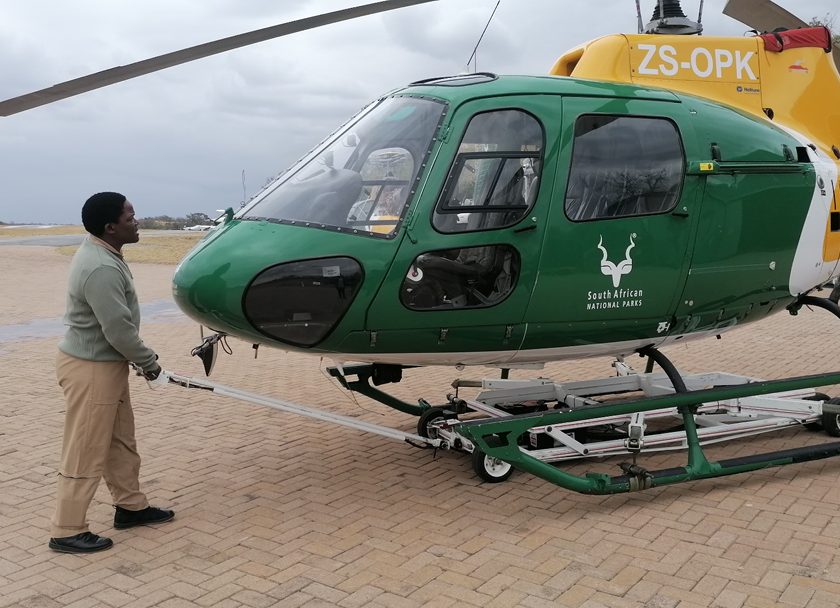
Simelane, who studied in the United States of America, had his first helicopter ride when he was 19.
“It was frighteningly exciting. We flew from Grand Central Airport towards Pretoria. I remember telling myself that I wanted to do this for the rest of my life,” he says.
At the time, there was only one person of colour in the country qualified as a commercial helicopter pilot. “I was determined to change that. Little did I know that it would be a painstaking task to find funding. I eventually got funding from the Transport Education Training Authority,” says Simelane.
His promotion sees Simelane moving from the rank of pilot to SANParks’ chief pilot. He is now also responsible for operations, as per the South African Civil Aviation Authority’s (SACAA) regulations.
“I am humbled by the trust vested in me and my team to take Air Services to new heights. I think it’s important that I am a person of colour, but that should not be the be-all and end-all of this promotion. I believe I have a lot to offer, not just Air Services but the organisation at large,” says Simelane.
To youth hoping to follow in his footsteps, Simelane says being a pilot is not glamorous. “Forget becoming a pilot if you have no passion for aviation. Without passion, you will not see beyond the inevitable challenges on your journey to becoming a pilot.”
Fly Black Hawk, fly!
It comes as no surprise that Simelane, known as the ‘Black-Black Hawk’, is progressing through the ranks.
“He is a skilled professional pilot, with solid management and leadership skills, is approachable and has strength of character to boot,” says SANParks Chief Operating Officer Lize McCourt.
When he arrived at the SANParks Airwing in Skukuza, Mpumalanga, almost a year ago, Simelane wasted no time forging a solid relationship with the SACAA – an endeavour that serves SANParks well in terms of aviation compliance.
Air Services is part of the new Area Integrity Management Unit, which was established to better coordinate safety and security within SANParks.
“We believe the team will continue to excel with Simelane at the helm of Air Services and that he will take it to the next level. Fly Black Hawk, fly,” says McCourt.
Building a society free of State capture
Building a society free of State capture tsoanaThe scheduled hearings of the Judicial Commission of Inquiry into Allegations of State Capture, Corruption and Fraud in the Public Sector, including Organs of State, recently ended, more than 1 000 days after the first witness testimony was heard.
While the commission’s chairperson, Deputy Chief Justice Raymond Zondo has said it may be necessary for a few more witnesses to testify, the work of the commission is now one step closer to completion.
This is a significant milestone that brings us ever closer to a reckoning with one of the most ruinous episodes in the history of our democracy.
Even before Judge Zondo submits his findings and recommendations to the President, we can all agree that the commission’s work has been invaluable.
Over the course of three years, we have heard testimony detailing alleged acts of corruption on a massive scale. We have heard about actions that resulted in the theft of billions of rands of public money.
We have heard how many public institutions and state-owned companies were deliberately weakened.
This exposure of the nature, extent and depth of state capture did not take place behind closed doors, but was broadcast to the entire country. By allowing all South Africans to follow the commission’s proceedings, it has helped to instil public confidence in our democracy in the way it promotes openness and transparency.
The country owes a debt of gratitude to all who were involved in the work of the commission; from those who investigated, researched and compiled a huge amount of information; to the many witnesses who testified and provided evidence; to the journalists who diligently reported on the proceedings; to the lawyers who helped present evidence.
We also owe a debt of gratitude to the many individuals, some of whom remain unknown, whose actions led to the establishment of the commission in the first place.
These are the people who unearthed these alleged criminal acts, who resisted, who spoke out and who took up campaigns – both public and behind the scenes – to end state capture. It is thanks to them that we now speak of state capture in the past tense.
State capture did not end of its own accord. It was brought to an end by the concerted actions of South Africans from all walks of life, working in various areas to restore the values of our constitutional democracy. And it is up to all of us to ensure that these practices are never allowed to happen again.
Over the past three years, we have taken several important steps to tackle corruption and state capture.
We have been painstakingly rebuilding bodies like the National Prosecuting Authority (NPA), the South African Police Service, the South African Revenue Service and others.
We have set up new structures, like the Investigating Directorate in the NPA to prosecute high-level corruption and the Special Investigating Unit (SIU) Special Tribunal to recover stolen public funds. We have improved our crime-fighting capacity through the establishment of the Fusion Centre, which brings together various law-enforcement agencies to share information and coordinate the investigation and prosecution of crime.
We have changed the leadership at several strategic state-owned enterprises (SOEs), and begun the process of restoring them to financial and operational health. We are working towards a new SOE model that promotes greater transparency, accountability and sustainability.
Much of this work is ongoing. There are areas where progress has been far slower than we would have hoped, and these are now receiving closer attention.
The findings and recommendations of the commission will
undoubtedly strengthen these efforts. We expect that the commission will identify some of the systemic weaknesses that allowed state capture to take place. This will empower us to take further corrective measures.
While we can say that the era of state capture is over, we have not defeated corruption. Fraud and corruption remain pervasive and deeply entrenched in both the public and private sectors.
Although it may not be on the scale of state capture, such criminal activities cost our country greatly, weaken our institutions and deprive South Africans of many basic needs.
Corruption is deeply immoral at the best of times, but takes on a greater depravity in the midst of a humanitarian crisis. One speaks here of the despicable acts of corruption last year in the procurement of goods and services needed for our fight against the COVID-19 pandemic.
We acted swiftly to stop such corruption, to identify those responsible and to take action against them. This is proof of our commitment to root out corruption.
We tightened up Treasury regulations, established the fusion centre and gave the SIU a wide-ranging mandate to investigate all COVID-19-related corruption allegations.
In a first for the country, we also published online the details of all COVID-19 procurement contracts across all public entities.
The damage done to our country by state capture is deep. Its effects will be felt for many years to come. But, working together, we have started to put things right. We have started to rebuild and restore.
We can expect that the outcomes of the Zondo Commission will immeasurably strengthen these efforts. They will give us an opportunity to make a decisive and lasting break with the state capture era.
Much work lies ahead, and many challenges must still be confronted. But we are on our way to building a society that is free from the evils of state capture and corruption.
COVID-19
COVID-19 SiboneloCaring cyclists help feed community
Caring cyclists help feed community SiboneloTwenty children assisted the Gugulethu Community Kitchen to deliver food to township residents’ homes, by bicycle, during the lockdown-enforced school holiday.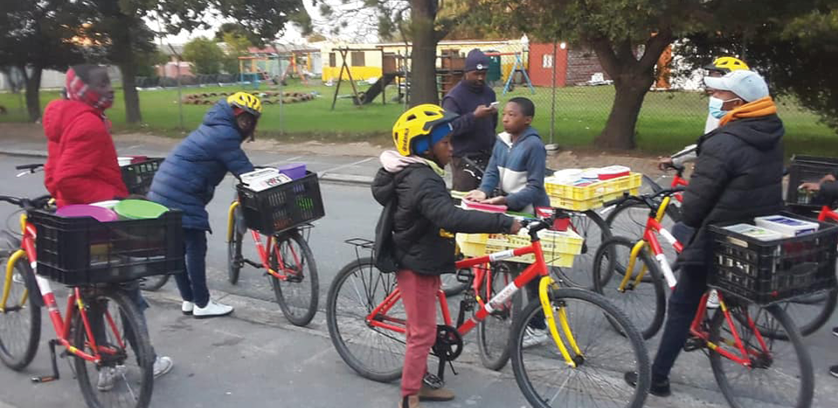
The non-profit organisation’s Director, Maria Dlokolo, says the idea to use bicycles came about last year when it realised that the elderly, who have comorbidities, and people with disabilities could not move freely in the community due to the Coronavirus Disease (COVID-19).
The organisation spoke to Gugulethu-Seaboard CAN, a group of Atlantic Seaboard residents who came together to support Capetonians with COVID-19 challenges, and the idea to use bicycles was sparked.
“When schools are open, we usually work with unemployed youngsters, but they often have other commitments. Hence the idea to ask school children for help. They delivered food to more than 220 people in the township,” says Dlokolo.
The project is part of the community kitchen’s work to cook and serve meals to over 600 people daily, says Dlokolo. The bicycles are used to deliver breakfast and lunch from Monday to Saturday, with breakfast packs delivered from 06:30am.
“The Gugulethu-Seaboard CAN supports Gugulethu, a working-class suburb of approximately 25 000 people. The average monthly household income in the area is under R3 000, and over 60% of the working age population is not economically active,” says Dlokolo.
The community kitchen cooks over 40 kilograms of chicken a day. It also serves samp, rice and vegetables for lunch. Breakfast is usually maize meal porridge or oats.
“The Department of Social Development assists us with vouchers, every two weeks, which we use to buy R1 000 worth of spices, oil and soup.
The Violence Prevention Through Urban Planning community development organisation also gives us R1 500 in vouchers, which helps buy meat and other things we need," she says.
DUT Ninjas win Makerthon
DUT Ninjas win Makerthon tsoanaSix KwaZulu-Natal students have invented a wearable device to help curb the spread of the Coronavirus Disease (COVID-19) in the workplace.
The students who are studying towards an information and communications technology (ICT) qualification at the Durban University of Technology (DUT), are called DUT Ninjas after building a prototype with ultrasonic sensors that measure the distance between two objects. If a person is less than one metre away from another, the device beeps.
It will also have a unique number, assigned to the employee wearing i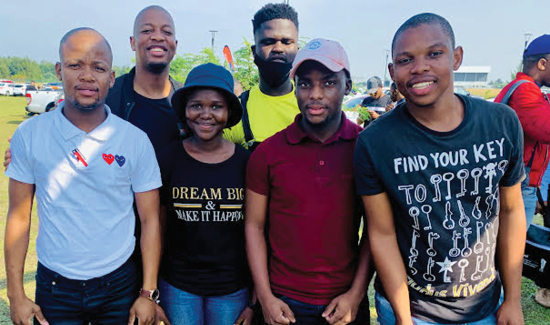 t, and will record every other device it connects to. This will ensure efficient contact tracing.
t, and will record every other device it connects to. This will ensure efficient contact tracing.
This device was built in less than 12 hours at a recent Makerthon held at the Richards Bay Industrial Development Zone Techno Hub.
The Makerthon, an innovation challenge, provided innovators, marketers and developers with an opportunity to identify open source, low-tech and inexpensive hardware to produce up-to-date technologies. It was organised by the Department of
Communications and Digital Technologies, AlgoAtWork Robotics and the National ICT Youth Council.
The DUT Ninjas demonstrated their product to government representatives and judges.
Group leader Fanie Ndlovu says they wanted to solve COVID-19 problems in the workplace, especially that of its distancing. “The device will also be equipped with a pulse and temperature sensor, which will check an employee’s heart rate and temperature in real time. It will also be used beyond COVID-19, to monitor other diseases.”
Ndlovu says the team won because of its ability to identify a problem, present it clearly and design a demo in less than 12 hours.
Team member Andile Chonco says they knew nothing about electronic components and the Makerthon gave them an opportunity to learn. Another team member, Mpendulo Xulu, says they enjoyed the experience and competed against the best. “Our leader advised us to enjoy ourselves. Being champions was a surprise.”
“The competition was challenging. We had to identify problems faced by Richards Bay industries and try to fix them using robotics. I am not used to this, as I am an ICT student who solves problems using web applications,” says team member Mbali Nongalo.
Easy Bakes rises to success
Easy Bakes rises to success JoyStudying to become a chef has enabled Nonjabulo Nzuza (35) to explore a variety of business opportunities, such as baking, running a coffee shop, offering baking classes and selling her own ready-to-mix cake brand called Easy Bakes.
 The Pietermaritzburg-born Nzuza started Injabulo Foodworks (Pty) Ltd in 2015, after completing a Diploma in Catering and Hotel Management from the School of Fashion Design.
The Pietermaritzburg-born Nzuza started Injabulo Foodworks (Pty) Ltd in 2015, after completing a Diploma in Catering and Hotel Management from the School of Fashion Design.
She was inspired to become a chef by watching cooking shows on television, reading food magazines and trying out recipes.
“I started my business baking muffins and cakes from my kitchen and sold them on the streets for people to enjoy. Most people were impressed with my carrot cake,” she says.
While business has not always been smooth, Nzuza has had more good days than bad ones. This encouraged her to keep going and she started receiving orders from regular customers, which helped the business grow. “I started looking for a place to rent in town, so that I could run my business from there,” she says.
She successfully applied for funding from the National Youth Development Agency (NYDA) in 2019, and received R50 000. “This funding has expanded my business and I was able to permanently employ four people. The baking business has grown so much that it has given birth to a coffee shop called Café Tatham by Njabulo Foodworks,” says Nzuza.
Her business struggled a lot during 2020’s various lockdowns. “I had to think of ways of sustaining my business so that I could continue to earn an income. This is when the idea of a new product, called Easy Bakes, dawned on me. Easy Bakes is basically my recipes in a packet. They are loved by many people, across all nine provinces,” she says.
Nzuza has created six jobs for locals through Injabulo Foodworks and also offers baking classes. “I offer baking classes so that I can impart my skills to other people.”
Her products can be bought at Foodpak in Victoria and Kitchen and Stuff in Pietermaritzburg. They are also available at her coffee shop, which is located near the Pietermaritzburg City Hall. “We also use courier services to deliver our Easy Bakes products to clients across the country,” she says.
For more information about Nzuza and her business, connect with her on Facebook @InjabuloFoodworks.
For more information about NYDA funding, contact 087 158 6345 / 5738 / 4742 or email info@nyda.gov.za
Golden Youth Club uses the arts to teach
Golden Youth Club uses the arts to teach JoyThe Golden Youth Club is using the performing arts to teach children about various issues, including the Sustainable Development Goals, which aim to bring peace and prosperity to all people by 2030.
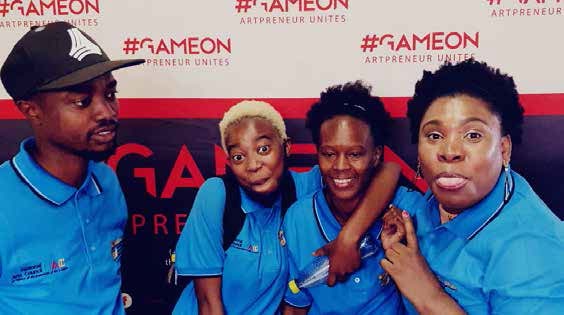 Club founder Nomatlou Mahlangu explains that the club focuses on issues that affect learners in their daily lives.
Club founder Nomatlou Mahlangu explains that the club focuses on issues that affect learners in their daily lives.
“We reflect on them and turn thoughts into an artistic performance – whether it’s a song, dance or a play. Our aim is to convey that, regardless of where you come from, there is one language we can all understand,” says Mahlangu.
“For us to understand who we are and where we are going, we need to first understand our history. As African people, our education is presented through the arts, hence our club even teaches the Sustainable Development Goals through the performing arts,” she adds.
In another education drive, the club took learners on a 10-day tour of Tshwane to teach them about climate change. “During the tour, we visited seven regions to emphasise the message of keeping our environment toxin free,” says Mahlangu.
With a vision of making performing arts more accessible to audiences in South Africa and across the world, Mahlangu says the club offers a variety of programmes including dance, music, poetry, theatre, visual arts, fashion design and peer education.
It partners with organisations in Germany, Ukraine, Malawi, Brazil, Uganda, Egypt, Israel and Tunisia, and has travelled to some of these countries to learn about them and engage with their citizens on social issues.
Mahlangu says the arts has an important role to play in changing society, and encourages parents and communities to expose children to the arts from a young age.
Her interest in young people was inspired by the African phrase ligotshwa lisemanzi, which roughly translated means to train a child from a young age. “We must encourage our children to utilise their talents, as they can be successful when they do so,” she says.
The club also promotes indigenous languages when members travel to other countries. “In arts, difference is celebrated. We need to showcase what is ours, so others can learn from us,” says Mahlangu.
For more information, visit www.goldenyouthclub.org
Govt increases vaccine capacity
Govt increases vaccine capacity SiboneloThe National Department of Health says it is increasing capacity to strengthen the fight against the Coronavirus Disease (COVID-19) pandemic.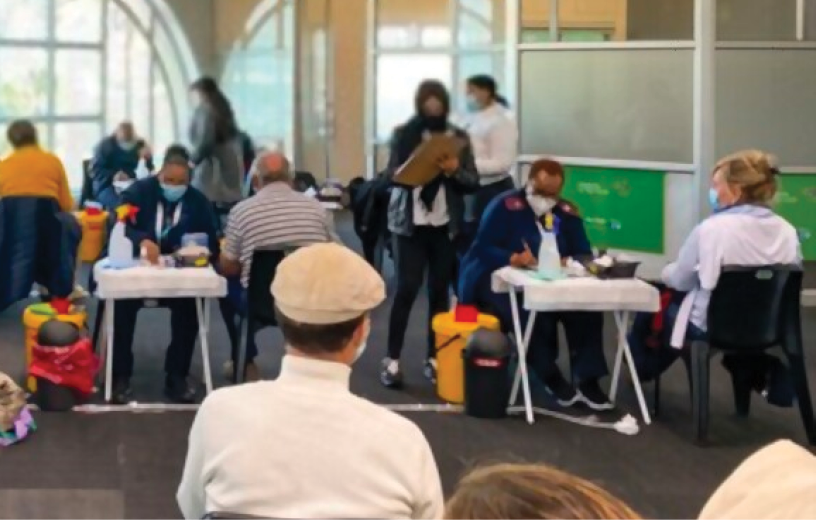
The department’s spokesperson Popo Maja says the recent public unrest and vandalism to property in Gauteng and KwaZulu-Natal have affected access to essential health services, in general, and operations at some vaccinations sites.
“As a result, some vaccination sites had to shut down for the entire unrest period. However, most sites, especially in Gauteng, are back on track,” he says.
To address the vaccination interruption, the depart- ment is increasing its number of vaccination sites and sites will be operating on weekends, in some areas.
“The department is also adding more personnel to vaccinate as many people as possible, in line with a call by President Cyril Ramaphosa to vaccinate
300 000 daily. We have received commitment from the private sector, civil society and other stakeholders to support government to accelerate the roll-out programme,” he says.
He adds that contingency plans are being put in place to identify the closest sites in communities that were affected by the unrest, to ensure that people do not travel long distances to access life-saving vaccines.
“Vaccines that were allocated and reserved for the affected sites have been directed to other sites and provinces to prevent wastage, due to expiry dates. Once the sites are fully operational, new stock will be supplied,” says Maja.
The President recently confirmed that the country’s most effective weapon in the fight against COVID-19 is an effective and comprehensive vaccination programme. He also called for acceleration of the vaccination programme so that the vast majority of the adults can be vaccinated before the end of the year.
“We urge all eligible people to register to vaccinate, to protect themselves and their loved ones. Vaccines save lives,” says Maja.
To help accelerate the roll-out programme, eligible citizens can present themselves at a vaccination site without an appointment.
The President also announced that by October, South Africa is scheduled to receive around 31 million additional Pfizer and Johnson & Johnson vaccines.
“This supply pipeline means that there will be sufficient vaccine doses available for the rest of the year,” he said.
Help prevent suicide
Help prevent suicide tsoanaMore people die as a result of suicide than HIV, malaria, breast cancer, war and homicide.
This is according to the World Health Organisation’s (WHO) latest statistics, which show that over 700 000 people die by suicide each year – that is one in every 100 deaths and approximately one person every 40 seconds.
“We cannot – and must not – ignore suicide,” says Dr Tedros Adhanom Ghebreyesus, Director-General of the WHO.
“Each one is a tragedy. Our attention to suicide prevention is even more important now, after many months of living with the Coronavirus Disease pandemic, with many of the risk factors for suicide – job loss, financial stress and social isolation – still very much present,” he adds.
World Suicide Prevention Day
World Suicide Prevention Day was launched on 10 September 2003, by the International Association for Suicide Prevention.
It aims to prevent suicide and suicidal behaviour, alleviate its effects and provides a forum for academics, mental health professionals, crisis workers, volunteers and suicide survivors.
According to the South African Depression and Anxiety Group (SADAG), there are 23 suicides and 230 serious suicide attempts recorded in South Africa daily.
“Suicide is still a very taboo topic in our society – no one wants to talk about it; no one knows how to talk about it and parents don’t want to talk to their children about it in case it ‘plants ideas’. However, it is a very real issue, and can be seen by the increasing daily calls we receive,” says Cassey Chambers, SADAG’s Operations Director.
“If more people are aware of suicide and know how to get someone help before it’s too late, we can help reduce the suicide rate,” she says.
Possible suicide warning signs include:
- Talking about ending one's life, dying or suicide.
- Strong wish to die or a preoccupation with death and dying.
- Giving away prized possessions.
- Signs of depression, such as moodiness, hopelessness, withdrawal, difficulty with appetite and sleep, and loss of interest in usual activities.
- Increased alcohol or drug use.
- Hinting about not being around in the future or saying goodbye.
- Drastic behaviour changes.
- Making arrangements to take care of unfinished business.
If you or someone you know needs help, contact SADAG’s 24-hour suicide crisis line at 0800 567 567.
How to apply for the R350 grant
How to apply for the R350 grant tsoanaIf you do not have an income and are between the ages of 18 and 60, you can apply for the Special Coronavirus Disease (COVID-19) Social Relief of Distress (SRD) Grant.
Government has reintroduced the SRD Grant of R350 per month to help qualifying applicants who have no financial support, to survive the continued hardships brought about by the COVID-19 pandemic.
The initial SRD Grant, which was discontinued on 30 April, had a positive impact on successful applicants’ lives, says Social Development Minister Lindiwe Zulu.
She adds that gover- nment has allocated R26.7 billion for the grant, which is available from August 2021 to March 2022. The allocated amount includes the South African Social Security Age ncy’s (SASSA) administration costs.
ncy’s (SASSA) administration costs.
Applications will be considered from the month in which the application is made, and paid until 31 March 2022, providing the qualifying criteria are met. “This requirement will be confirmed through monthly validations of every application,” the Minister says.
Who can apply for the grant?
According to the Minister, applicants must:
- Be South African citizens; permanent residents or refugees registered on the Home Affairs database; people who hold special permits under the Special Angolan Dispensation or the Lesotho or Zimbabwe Exemption Permit Dispensations; or asylum seekers, whose Section 22 permits or visas are or were valid on 15 March 2020.
- Live in South Africa.
- Be between the ages of 18 and 60.
- Be unemployed.
- Not be receiving any social grant.
- Not be receiving an unemployment insurance benefit and does not qualify to receive an unemployment insurance benefit.
- Not be receiving a stipend from the National Student Financial Aid Scheme or other financial aid.
- Not be receiving any other government COVID-19 response support.
- Not be a resident in a government-funded or subsidised institution.
Minister Zulu encourages those who previously applied and still meet the criteria to reapply, to enable the department to assess their eligibility. All applications will be treated as new applications, every month.
Why reapply?
Minister Zulu says
reapplications are important because people’s circumstances may have changed. The department will confirm applicants’ personal details, and assess their income and financial status.
Applicants must also accept the grant’s declaration and consent, which have been strengthened to comply with the Protection of Personal Information Act of 2013; and must give consent to SASSA to verify their identity, residency, income and social security benefits with any other institution.
“All recipients who may have not received some of their payments during the first iteration of the grant will certainly receive their payments. This new iteration will not affect those payments,” Minister Zulu confirms.
During the first iteration, almost 10 million applic- ations were received and just over six million were approved. Payments amounting to R24 billion were made, and an additional R15 billion was spent topping up all grant types for six months.
All of the applications were received via online and digital channels, which speeded up the process.
“We have taken note that the majority of the previous applications were paid to males between the ages of 18 and 35. To address this gender imbalance, the grant has now been opened to include caregivers [who don’t receive any other grant], the majority of whom are women,” says Minister Zulu.
How to apply?
Applications can be made via the:
- SASSA website: https://srd.sassa.gov.za.
- WhatsApp line: 082 046 8553.
- Unstructured Supplementary Service Data line: *134*7737#.
SASSA has also added two new online channels for applications, to ease the pressure on the website, namely https://govchat.app/login and Facebook messenger at https://www.facebook.com/govchat.org
Applicants must only submit one application, using one of the channels, and must include all of the relevant information in their application, including their banking details, so that payments can be made as soon as the criteria have been met.
Payments will be made directly into the beneficiary’s bank account.
Applicants who do not have bank accounts will receive their payment via SASSA at the SA Post Office, Post Bank or Bank Mobile Money Transfers (cash send).
ICT small businesses receive support
ICT small businesses receive support JoyThe Innovator Trust has launched an incubation programme for young, technology start-up entrepreneurs.
 The programme has been created to support the growth of small, black-owned information and communications technology (ICT) businesses, which have been operating for less than two years.
The programme has been created to support the growth of small, black-owned information and communications technology (ICT) businesses, which have been operating for less than two years.
#MyStartUpMyStory is a two-year programme provides start-ups with access to one-on-one mentorship, skills training and cash grants.
Tashline Jooste, the CEO of Innovator Trust, explains: “For 10 bold and innovative start-up businesses, which have had the courage and grit to start with the resources they have available, the Innovator Trust will provide support through training, resources and mentorship in building them to a point of sustainability.”
To qualify, the businesses must be in the ICT sector, registered with the Companies and Intellectual Property Commission, have been in business for between one month and two years, and generating a turnover of at least R100 000 a year. The business owners must be between 18 and 35 years of age.
“The programme is another initiative from Innovator Trust to stimulate job creation and drive innovation among small, black-owned technology-focused businesses in South Africa,” says Jooste.
For more information about #MyStartUpMyStory go to www.innovatortrust.co.za, call: +27 010 010 5686 or email: info@innovatortrust.co.za
Indigenous Games could go ahead
Indigenous Games could go ahead SiboneloAs the number of vaccinated South Africans increases, so too does the opportunity for mass participation and competitive events, such as the Indigenous Games Festival, to commence.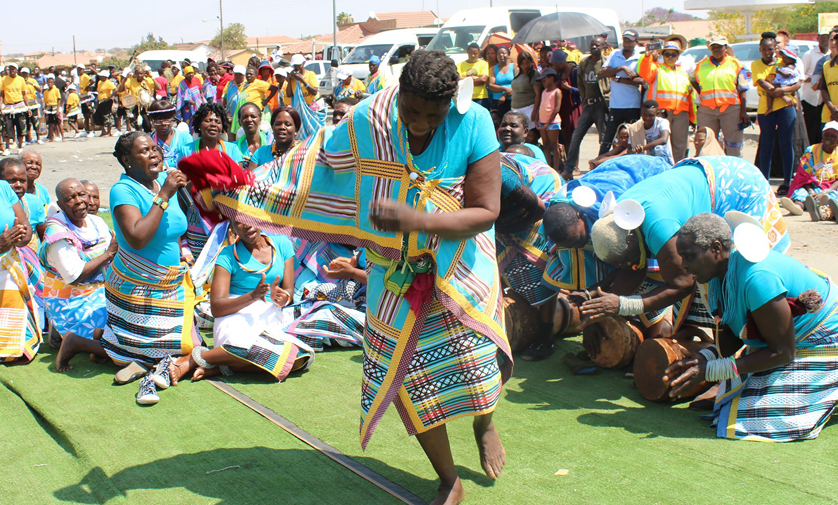
The Chief Director for Communications at the Department of Sport, Arts and Culture, Mickey Modisane, says there is a possibility that the Indigenous Games Festival will be held this year.
The annual festival celebrates South Africa’s varied indigenous games, with approximately 2 800 participants from all provinces embracing the African Renaissance and popular cultural activities.
While the festival was previously held in Limpopo, provinces will now take turns to host it.
The festival sees nine provincial teams competing for four days, in nine codes, including kgati, morabaraba, ncuva, khokho, dibeke, Iintonga, diketo, jukskei and drie stokkies.
The top-two teams then participate in the World Sport for All Games, in Jakarta, Indonesia.
“Participating in the games depends on the Coronavirus Disease Disaster Management Act risk-adjusted levels, as per President Cyril Ramaphosa’s announcement, particularly with reference to opening of mass participation events. For this to happen, it will depend mainly on statistics of the pandemic outbreak, the recovery rate and vaccination growth,” says Modisane.
Participating in cultural activities
Zamile Nduli, a gym supervisor at the University of KwaZulu-Natal, encourages citizens to participate in cultural activities, that are suitable for small groups or families, to keep fit and strong.
“There are various benefits that all age groups can enjoy from playing games and exercising,” she says.
For children, the benefits include learning new skills, strengthening bones and muscles, reducing the risk of being overweight, creating a platform to make new friends and learning leadership skills.
For adults, participating in sport and games can reduce or prevent the development of chronic diseases, help with weight management, improve mental health, strengthen bones and muscles and promote psychological and cognitive well-being.
For the elderly, it decreases the risk of falling. slows down the physiological changes of ageing that impair exercise capacity, helps manage chronic diseases better, minimises the risk of physical disability, increases longevity and promotes psychological and cognitive well-being.
Listen up!
Listen up! SiboneloOver 100 people are able to hear more easily and understand speech better, thanks to a life-changing bone conduction implant programme.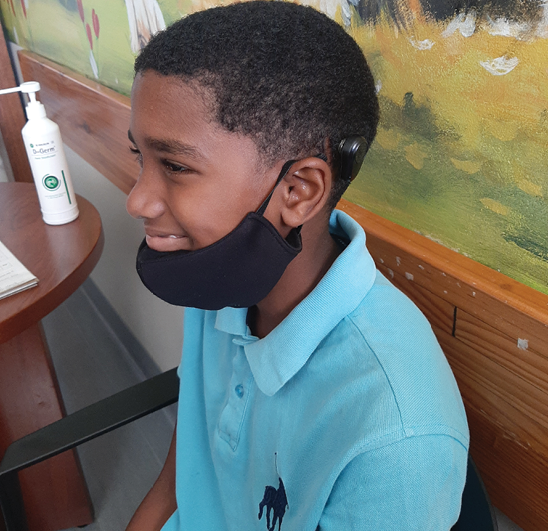
The programme, run by Groote Schuur Hospital (GSH) and Red Cross War Memorial Children’s Hospital (RCWMCH), celebrates a decade of patient-centred care this year.
“Eleven years ago, bone conductive hearing aids were no longer being manufactured so we started the bone conduction implant programme. We came up with the bone conductive device as part of the programme,” says GSH Dr Estie Meyer, who leads the programme.
A bone conduction processor can be used when you cannot wear a normal hearing aid. “For instance, if you do not have an ear canal, if you have chronic active leaking ears or if you have a big conductive hearing loss,” Dr Meyer explains.
Silva Kuschke, the Chief Audiologist at RCWMCH, says hearing loss is communication loss. “Assistive devices like these help children with conductive and mixed hearing losses to overcome barriers to communication so that they can enjoy
being children. Every child has the right to express themselves, have access to sound and learn.”
Garrison Thomas (12), one of the children in the programme, has a long history of middle ear disease and subsequent moderate conductive hearing loss. He was fitted with a bone conduction processor on a softband in May 2016 and received his implant in June 2016.
“The processor has made my life much easier in the classroom, as I am able to hear my teacher better and don’t get as tired. Thanks to the programme, I can now just get on with my work,” he says.
“It fills us with wonder every time we see a child with conductive hearing loss literally light up like a thousand stars when we switch on their bone conduction device,” says Kuschke.
The hospitals accept referrals from across the Western Cape and also help foreign national patients from neighbouring sub-Saharan African countries.
Patients are referred to audiology departments at the hospitals, where a hearing aid evaluation is done to determine bone conduction device candidacy.
While implants can be done at the age of five, in low- to mid-income countries like South Africa, theatre time is limited and budget constrains are a reality. “We therefore implant most children at the age of eight, in a single-stage surgery,” says Dr Meyer.
Looters will be prosecuted
Looters will be prosecuted tsoanaGovernment has called on the public to not support looting and the selling of stolen goods.
The recent unrest and looting in South Africa is estimated to have cost the country about R50 billion in revenue and placed 150 000 jobs at risk.
The violence not only affected the already fragile economy, but also resulted in over 300 people losing their lives and a number of properties destroyed.
“What is most devastating is the toll that these events have taken on people’s lives, livelihoods and sense of security. The human toll will take much longer to repair… It is clear now that the events were nothing less than a deliberate, coordinated and well-planned attack on our democracy,” said President Cyril Ramaphosa, when addressing the nation recently.
“There is no grievance or political cause that can justify the violence and destruction that we have seen,” he added.
The acts of violence were driven largely as a result of opportunistic acts of criminality, with groups of people instigating chaos merely as a cover up for looting and theft. The victims of violence, from truck drivers to business owners and community members, did nothing wrong.
Looting is illegal
Looting is a crime and government is determined to ensure that those responsible face the full might of the law.
Anyone who receives, buys or is in possession of looted goods, without lawful reason, is guilty of a criminal offence. The police will seize or recover looted or stolen goods and arrest anyone in possession of them.
The goods will be used as evidence in court and then returned to their rightful owner when the case is complete. If the rightful owner can’t be identified, the goods will be forfeited to the State.
The President reiterated that the poor and marginalised bear the ultimate brunt of the destruction. It will deepen poverty and unemployment, and cause even greater hardship for millions of South Africans, he explained.
“The threat to our country and to our democracy remains present and real… We must therefore remain vigilant and resist any efforts to incite further violence… We call on all South Africans to encourage calm and restraint, to desist from sharing false information and to report any incidents of violence to the police immediately. By doing these basic things, we can all work to protect South Africa.”
Report violence and looting to your nearest police station or call the crime stop number at 08600 10111.
Marosa Molai encourages vaccination
Marosa Molai encourages vaccination tsoanaA nurse who worked in a COVID-19 high care hospital ward urges the public to get vaccinated.
Professional nurse Marosa Molai advises citizens not to wait until they get infected with the Coronavirus Disease (COVID-19) before they get vaccinated.
“You might not make it. This virus is deadly,” says Molai, who vaccinates the public at Universitas Hospital’s vaccination site in Bloemfontein in the Free State.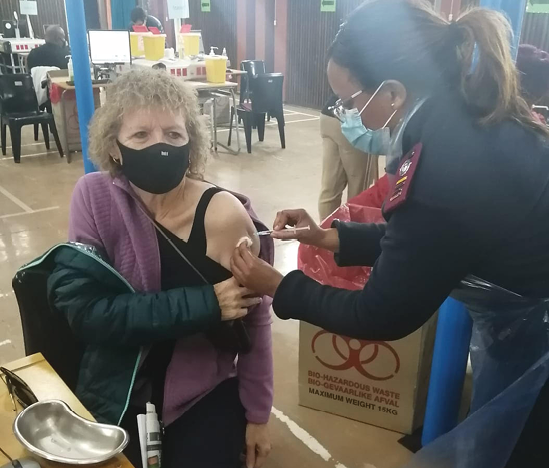
She has seen first-hand how COVID-19 can make people very sick and die.
“I started working at the vaccination site in April 2021. So far, I have been encouraged by the positive attitude and response that most people have shown towards the vaccination programme. I also get to further explain the importance of vaccination.”
Molai, who also worked in the hospital’s high care COVID-19 ward, says it is an honour to be part of the team that saves lives. “I have personally seen how COVID-19 has affected people and how many lives have been lost since the virus hit the nation,” she says.
Molai had to emotionally prepare herself for the worst when she worked in the high-care ward, because many people died in a short period of time. “Having worked with people who were infected with COVID-19 has made me strong, but has also affected me emotionally. It is not easy to deal with family members who have lost their loved ones to the virus.”
Molai is afraid to visit her mother because she does not want to unnecessarily expose her to the virus, regardless of how much she misses her. “It is very tough, but things will get better because people are responding well to the vaccine and have come in numbers to get vaccinated.”
Molai encourages the public not to give up the fight against the pandemic.
“The current situation will change, but it starts with you. Wear your mask, sanitise and keep a physical distance to minimise the spread of new infections while we roll out the vaccination programme. "Wait patiently for your turn to get vaccinated, but do your part as an individual to not get infected and infect others,” she says.
She encourages those who are scared of getting the vaccine to not believe the myths and fake news, and to register for the vaccine so that the country can win this fight.
Mini libraries for the visually impaired
Mini libraries for the visually impaired JoyThe Western Cape government has established 27 mini libraries, inside existing public libraries in rural areas, to ensure that visually impaired community members have access to the resources they need.
 The programme is being run by Western Cape MEC for Cultural Affairs and Sport Anroux Marais, Executive Mayor Grant Riddles and the South African Library for the Blind (SANCB), which provides the database for the programme.
The programme is being run by Western Cape MEC for Cultural Affairs and Sport Anroux Marais, Executive Mayor Grant Riddles and the South African Library for the Blind (SANCB), which provides the database for the programme.
The SANCB, an agency of the Department of Sport, Arts and Culture, renders a library and information service to visually impaired and print-handicapped readers.
At the recent opening of the mini library at Riversdale Public Library, MEC Marais said the facility will be equipped with screen reading software that provides text and images as speech (voice) or Braille output, and reading-assistive technology, which enables the user to see text and hear it read aloud at the same time.
“This is part of our cultural affairs and sports efforts to ensure inclusivity across the province. The mini library also enables those who have dyslexia, other disabilities or limited literacy skills to access resources in formats that make it easier for them to benefit and enjoy literature content,” she said.
According to SANCB, there are over 724 000 people in South Africa who have a vision impairment.
Ofentse Rabaji is a waste whizz
Ofentse Rabaji is a waste whizz SiboneloMaking face masks from discarded cloth has ensured a successful business for an innovative entrepreneur.
Ofentse Rabaji (29) is making use of opportunities presented by the Coronavirus Disease (COVID-19) to keep the environment clean and provide employment for seamstresses.
Rabaji, the owner of Green Innovationz, uses discarded cloth to produce face masks, which prevents the cloth’s colourants from running into rivers and soil.
“When cloth is made, it is coloured using dye. If it’s discarded and it rains, the dye washes off and runs into soil and water. The chemicals used in dye are harmful to animals and people who consume the water. "If the dye is absorbed into the soil, it impacts its nutritional value in terms of planting,” he says.
Rabaji, who holds a Master of Science degree from North West University, says his company also ensures that cloth, which is not biodegradable, does not end up in the environment where it could be consumed by livestock and pets.
“Textile waste is not biodegradable so it could be in the environment for years after being discarded. Cows and sheep often eat small cloths, which can lead to digestion problems and the animals dying.”
Rabaji sells his face masks for R40 each.
He says the material, which he collects from seamstresses and designers in and around Potchefstroom, has enabled him to create employment for two seamstresses so far. “We sell the masks to local residents. They are made from cotton, with a spunbond filter.”
The business has been assisted with marketing by the National Youth Development Agency (NYDA), which also named Rabaji one of its 2021 trailblazers.
According to the NYDA, Rabaji defied the odds and proved that entrepreneurship could be the key contributor to the country’s fight against unemployment. His passion for the environment pushed him to upcycle and make very affordable masks.
Rabaji is now growing his business by using discarded plastic, paper and cardboard and turning it into furniture.
For more information visit www.nyda.gov.za
Partnership boosts Eastern Cape schools
Partnership boosts Eastern Cape schools JoyThe Eastern Cape Agricultural School Programme’s winners have been announced.
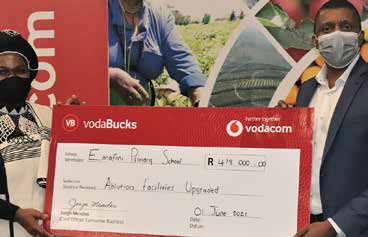 The agriculture and food security programme, which was launched earlier this year, included 131 underprivileged schools across the province.
The agriculture and food security programme, which was launched earlier this year, included 131 underprivileged schools across the province.
The partnership between the province’s Department of Education, Department of Rural Development and Agrarian Reform (DRDAR) and Vodacom encourages youth to play a significant role in food security, job creation and poverty alleviation, through active participation in agriculture, says Rural Development and Agrarian Reform MEC Nonkqubela Pieters.
“The relationship and partnership between the private sector and government is definitely a milestone in the development of rural people. This is an integral part of our district development model, where government and the private sector work together to support communities,” she says.
Schools had to demonstrate innovation and creativity in improving production; show a commitment to care for and ensure the sustainability of natural resources, including an understanding of adaptation and mitigation to climate change; and show innovation and creativity to improve farming methods and deliver a consistent supply of high-quality products.
Taking top honours in the primary school category was Emafini Primary School, followed by Meyiwa (second) and Mbewula (third) primary schools.
In the high school category, Phambili High School took first place, followed by Ncura Secondary School in second place.
The agriculture school category was won by Clarkebury Agriculture High. Frank Zibi High came second and Ulana Agriculture High School came third.
Emafini Primary School won overall, receiving the R418 000 grand prize, which was used to build ablution facilities. Phambili Secondary School (second) won R180 000, which was used to build a borehole and Clarkebury Agriculture School (third) received R161 000, which it used to build a fence.
Ready to serve South Africa
Ready to serve South Africa JoySouth Africa has a new group of Ministers and Deputy Ministers after President Cyril Ramaphosa made changes to his Cabinet as part of efforts to improve government.
 The new Ministers and Deputy Ministers were sworn-in at the Union Buildings, in Pretoria recently.
The new Ministers and Deputy Ministers were sworn-in at the Union Buildings, in Pretoria recently.
The changes were also necessary to fill a number of vacancies in Cabinet, after the include passing of Minister Jackson Mthembu and Deputy Minister Bavelile Hlongwa, and the appointment of former Deputy Minister Parks Tau as an MEC in Gauteng.
In addition, Minister Zweli Mkhize stepped down as the Minister of Health and the President accepted Minister Tito Mboweni’s request to be excused from his position as Minister of Finance.
President Ramaphosa also announced changes to the structure of government departments, with the separation of the Ministry of Human Settlements from the Ministry of Water and Sanitation.
“At the beginning of this administration, we had brought these two portfolios together on the understanding that the provision of water is closely tied to the development of human settlements.
“However, the reality is that water is a far broader issue, impacting not only on human settlements, but also on agriculture, industry, mining and environmental management,” said President Ramaphosa.
The Ministry of Water and Sanitation will enable a dedicated focus on ensuring that all South Africans have access to a secure and sustainable supply of water, he added.
The President also announced that there will no longer be a Ministry of State Security and the political responsibility for the State Security Agency will now be with The Presidency.
“This is to ensure that the country’s domestic and foreign intelligence services more effectively enable the President to exercise his responsibility to safeguard the security and integrity of the nation,” he explained.
Cabinet Ministers:
- Dr Joe Phaahla, the former Deputy Minister of Health, is the Minister of Health.
- Enoch Godongwana is the Minister of Finance.
- Mondli Gungubele, who served as Chairperson of Parliament’s Portfolio Committee on Social Development, is the Minister in The Presidency.
- Khumbudzo Ntshavheni, who served as acting Minister in The Presidency as well as Minister of Small Business Development, is now Minister of Communications and Digital Technologies.
- Thandi Modise, who served as Speaker of the National Assembly, is the Minister of Defence and Military Veterans.
- Mmamoloko Kubayi, the former Minister of Tourism, is the Minister of Human Settlements.
- Ayanda Dlodlo, the former Minister of State Security, is the Minister of Public Service and Administration.
- Stella Ndabeni-Abrahams, the former Minister of Communications, is the Minister of Small Business Development.
- Lindiwe Sisulu, the former Minister of Human Settlements, Water and Sanitation, is the Minister of Tourism.
- Senzo Mchunu, the former Minister of Public Service and Administration, is the Minister of Water and Sanitation.
Deputy Ministers:
- Philemon Mapulane – Deputy Minister of Communications and Digital Technologies.
- Dr Sibongiseni Dhlomo - Deputy Minister of Health.
- Dr Nobuhle Nkabane - Deputy Minister of Mineral Resources and Energy.
- Dr Chana Pilane-Majake - Deputy Minister of Public Service and Administration.
- Pinky Kekana, the former Deputy Minister of Communications and Digital Technologies, is the Deputy Minister in The Presidency.
- Zoleka Capa - Deputy Minister of Agriculture, Rural Development and Land Reform.
- Thembi Nkadimeng - Deputy Minister of Cooperative Governance and Traditional Affairs.
- Sdumo Dlamini - Deputy Minister of Small Business Development.
- Sindisiwe Chikunga - Deputy Minister of Transport.
- Dikeledi Magadzi - Deputy Minister of Water and Sanitation.
- Zizi Kodwa -Deputy Minister in The Presidency: State Security.
Register for your FREE COVID-19 vaccination
Register for your FREE COVID-19 vaccination tsoanaRegister to get vaccinated is easy!
Send the word register to 060 012 3456 on whatsaap internet access or data required
Or
Dial *134*832*IDNumber#
No ID Number? Just dial *134*832*
Free on all South African Mobile Networks
Or
Search EVDS South Africa online or go to: https://vaccine.enroll.health.gov.za
Any device with internet access
Or
Register by calling 0800 029 999
Monday – Friday: 7am to 8pm
Saturday, Sunday and public holidays: 8am – 6pm
Toll free on all South African Mobile Networks
You will need the following information when resgistering:
Your identification number (Passport, Asylum seeker number, RSA ID or refugee number)
The location where you want to be vaccinated (home or work)
If you are a member of a medical aid provider name and your medical aid number
You will receive an SMS with the details of your vaccination date and site after registering
Don’t delay. Register today!
Department of Health
Theatre plays now in cinemas
Theatre plays now in cinemas SiboneloThe South African State Theatre’s productions are now being screened in selected Ster-Kinekor cinemas countrywide.
The co-writer and Director of ‘That Night of Trance’, Ntshieng Mokgoro (48), says the partnership between the theatre and Ster-Kinekor has the potential to bridge the gap between the two entities.
‘That Night of Trance’, written by Mokgoro and Billy Langa, is being screened until 19 September.
Mokgoro says the partnership exposes the audience to varied content and enables viewers to explore different genres.
“Although we have a fair theatrical audience in South Africa, having this type of content available in cinemas will further inform and provide exposure to viewers who are still unsure about theatrical spaces. It will also inspire more young, up-and-coming performers to confidently master their skills in the theatrical platform,” she says.
Mokgoro says the play, which premiered in winter 2018, tells the story of a young woman who is stuck between two worlds – two cultures, two lifestyles and countless blinding opinion from society.
Pulane (the main character) is a raucous, beautiful young woman caught in a dream of sorts. Raised under a matriarch grandmother, after the sudden death of her parents, she instinctively becomes inducted to the throne her grandmother occupied.
Mokgoro says her inspiration to write and direct the play comes from many years of working with youth. “I used my platform to inform and address issues affecting the youth, especially with regard to their spiritual backgrounds and lifestyles, in the form of a theatrical play,” she says.
Tirisano Construction Fund
Tirisano Construction Fund SiboneloBid Window 3 of the Tirisano Construction Fund invites applications for the following Programmes:
Enterprise Development Programme (EDP)
- provision of working capital and equipment loans as well as grants for Professional Services to CIDB-registered and 51% Black-owned and managed construction companies.
Basic Education Programme (BEP)
- open to applications from entities and institutions that deliver programmes that aim to enhance the quality of mathematics and science at the basic education level, with a view to improving the pipeline of learners that transition to tertiary education.
Construction Occupation Development Programme (CODP)
- open to registered institutions and entities that deliver occupationally-directed training programmes consisting of both instructional and work-based learning towards becoming fully qualified artisans.
Details on how to apply and what information to include in your application are available on the IDC website at www.idc.co.za/tirisano
All submissions will be by e-mail. An e-mail containing your application should be sent to the specific email address for the Programme that you’re applying to, as follows:
Tirisano Enterprise Development Programme: TirisanoEDP@idc.co.za
Tirisano Basic Education Programme: TirisanoBEP@idc.co.za
Tirisano Construction Occupations Development Programme: TirisanoCODP@idc.co.za
For more information, please contact:
Industrial Development Corporation Call Centre on 0860 693 888
THE CLOSING DATE FOR APPLICATIONS IS 06 SEPTEMBER 2021 AT 17h00 NO LATE PROPOSALS WILL BE CONSIDERED
Vaccination targets higher education
Vaccination targets higher education JoyThe Department of Higher Education and Training is working on a strategy to do away with myths and fake news about the Coronavirus Disease (COVID-19) vaccine.
The department’s Minister Blade Nzimande recently announced the formal commence ment of the COVID-19 vaccination programme in the post-schooling education and training (PSET).
ment of the COVID-19 vaccination programme in the post-schooling education and training (PSET).
He said, however, that there is a fundamental need to address the myths, fake news, misinformation and misconceptions around vaccination.
“We are starting to better understand people’s knowledge, attitudes and perceptions about the COVID-19 vaccination. Guided by the PSET vaccine plan, I have asked Higher Health to develop a comprehensive communication strategy that involves all stakeholders within the PSET sector, so that we can jointly mitigate vaccine hesitancy and other misinformation prevalent in our communities and society at large,” the Minister said.
He added that it’s vital that everyone who becomes eligible for a vaccine takes up the opportunity. “Vaccines used in South Africa have been proven to be effective and safe.”
Minister Nzimande said the PSET vaccination programme extends and deepens the comprehensive sectoral contribution to the national COVID-19 response, which has been developed and supported by Higher Health since the beginning of the pandemic in South Africa.
The roll-out of vaccines in the sector started with all staff members in tertiary institutions, above the age of 35, including academia, management, frontline staff at residences, cleaning, security and support staff.
Minister Nzimande confirmed that the infrastructure and logistics that are setup within the PSET sector will provide easy access to the country’s general immunisation plan, and will reduce the load on the Department of Health’s vaccination points.
Approximately 100 vaccination sites were opened in the sector by Higher Health and the Department of Health in various parts of the country, to ensure the roll-out runs smoothly.
Western Cape 'best' to work from home
Western Cape 'best' to work from home SiboneloThe Western Cape is marketing itself as the ideal place to work from home, while touring the province.
Western Cape tourism promotion agency Wesgro has partnered with online accommodation service Airbnb to promote the province as the ideal destination to work from home.
According to Wesgro’s CEO Tim Harris, the Western Cape is the ideal destination for those looking for more from their working environment.
He says there are over 30 co-working spaces and 715 free Wi-Fi spots in the City of Cape Town alone, with many options in the province.
“We are the most energy secure province in the country, with a well-developed community of local and international entrepreneurs. We are excited about this joint effort to attract domestic audiences to our well-equipped destination,” he adds.
According to Airbnb data, domestic searches for long-term stays increased by almost 50% between 1 January and 25 February 2021, compared to the same period last year.
Western Cape Premier Alan Winde says the province wants to offer packages to digital nomads (people who can work from anywhere).
To promote the province as a working, while touring destination, Wesgro has launched the Remote Work Portal. The portal is a central hub, listing everything remote workers need to know to encourage long-stay visits, says Harris.
“The portal forms part of the ongoing remote work campaign, which is actively promoting the province as the preferred destination to work and play, as South Africans take advantage of the flexibility that working from anywhere brings.”
Wesgro’s budget to market Cape Town and the province is estimated to be between R2.65 and R4.24 billion.
To register to offer guests long-stay discounts, visit www.wesgro.co.za/long-stay/create/stay. To register as a co-working space, visit www.wesgro.co.za/long-stay/create/work. To offer guests move around options, visit: www.wesgro.co.za/long-stay/create/move-around.
